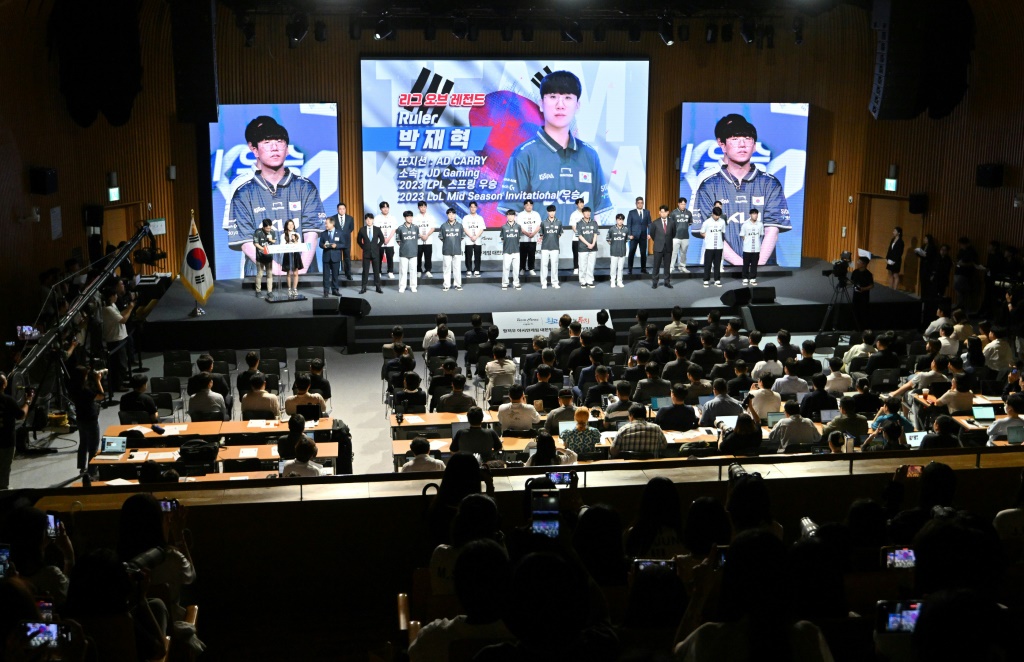Op-Ed: AI and AI game design, AI IP, and everything — When do the gloves come off?

Image: The South Korean eSport team at the 2023 Asian Games. — © AFP
This is the Cambrian Explosion for AI. Anything probably will happen. Maybe even something practical. AI is a natural asset for game design. Processing power alone makes it a must-have. There are plenty of AI game design generators already. The generators have sprung up effectively overnight. They’re working commercial things already.
These include a vast spectrum of image options, character assets, and particularly useful (let’s say invaluable) tweaking options for designers. The sheer amount of designer time and angst that can be saved is pretty amazing.
The next question is how far AI can go in game design. AI “species” are already learning how to play by watching the games online. This is a better learning environment than large language models (LLMs) in some ways. The practical factors in gameplay say a lot and can be directly interpreted through play.
A bit of backstory is required. Gaming has come a long way since Pong. Real time gameplay tech is no longer in the womb. It’s a fairly healthy toddler. It’s quite likely that the next techno-child, artificial general intelligence, (AGI) will thrive in gaming soon enough.
That said, this is a true quantum leap in so many ways. The tech is neither ready to play nor even fully understood, even by its advocates. AI produces glitches and imponderables on a routine basis. The new chips aren’t ready yet. It’s really a term for what AI ‘should” be than what it is at the moment.
That, however, is just the brochure. The realities of game design from inception to a playable game are demanding, some might say brutal. Also remember that a lot of this work gets done in that most creative and understanding of places, a corporate hierarchical culture.
Game design back ends include a truly tortuous array of detail, nitpicking options, and core marketing features as well as the actual games. Game mechanics alone can be demanding. Games like Warhammer didn’t just happen.
It’s easy enough to sit on the other side of the screen and complain about what doesn’t work. The complaints are all too well justified, but there’s a caveat or several.
One of the main reasons for dysfunction is the sheer scale of functions and software issues. MMOs aren’t simple. They need a lot of assets to run at all. Player vs player games require more back end than the seemingly simple gameplay implies.
This leads to an unavoidable issue for the games sector as a whole – Can AI design and develop quality games independently?
In theory, it definitely can. It has the raw speed and capacity. It should have no trouble writing software in any language.
(Why did the software LLM cross the road? It was unavoidable, and it’s awfully, awfully, sorry.)
The next question is slightly tougher – Should AI design and develop games? Short answer, yes, and with good reason.
The sector is hardly infallible. The constant complaints and gripes about games are based on basically one issue – Quality of performance. Things don’t run. Things don’t save. Huge corporations can’t be bothered to fix things. Glaringly obvious and ridiculous things happen in basic runtime.
The fixes are so many and likely to be expensive. The time factor for fixing things ranges from embarrassing to obscene. AI is an obvious fixer and quality monitor.
It could be used at all stages of testing, including “Gamma testing”, a final filter quality control for the finished product before release. That could include security, malware defenses, and just about anything you need to know is 100% OK.
The problem with all this is that it makes so much sense. There’s no reason why the most idiotic publisher wouldn’t use it. AI’s capacity for learning hasn’t even been defined yet. There’s enough new intellectual property (IP) value in these functions alone to be worth a lot of real money and save a lot of valuable time.
By the way – AI-generated images “may not be copyrighted”, but does anyone seriously believe that a whole population of images in a game isn’t intellectual property? Come off it.
You can also say that AI is a classic case of learning by doing. It can find and quantify problems at almost calculator-level definitions. It can also identify its own mistakes, something that humans aren’t exactly famous for doing.
In my opinion, when something makes so many useful baseline options available, it has to be explored. Ironically designers may find it’s also helpful in maintaining their artistic and creative independence. All that IP can be well presented and protected with AI support.
If you train AI how to do US Patent Office applications, you may just have a far more efficient way of managing your IP. That includes trademarks, and individual IP elements, and it can all be done quickly. Not bad value for clicking a couple of things.
At the moment, the future of AI looks blurry because of way too much hype and not enough solid outcomes. Gaming and gamers can benefit a lot from letting this new horse out of the cliches.
When you integrate human creativity and AI, there’s no going back.
_______________________________________________________
Disclaimer
The opinions expressed in this Op-Ed are those of the author. They do not purport to reflect the opinions or views of the Digital Journal or its members.
Op-Ed: AI and AI game design, AI IP, and everything — When do the gloves come off?
#OpEd #game #design #gloves





